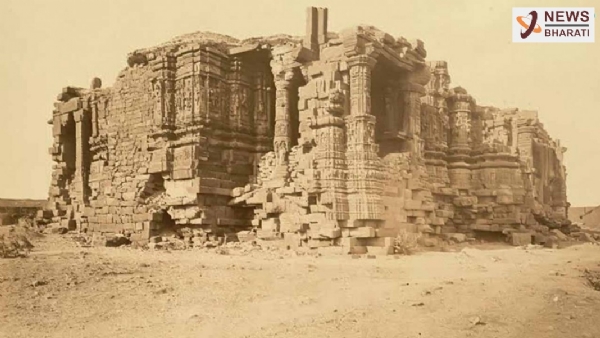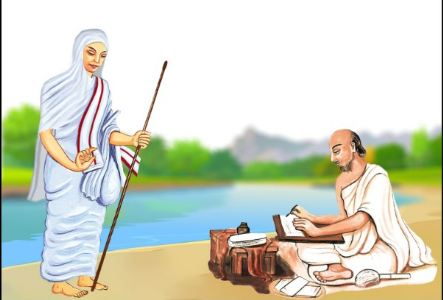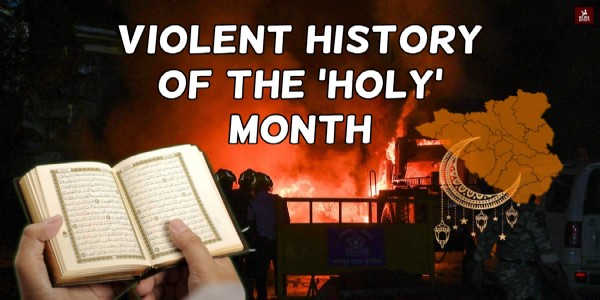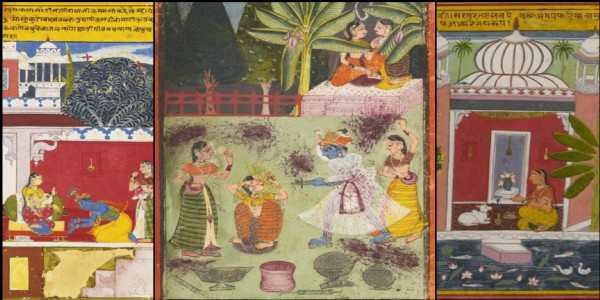Seeing Through The Perspective Of Past Persecution To Free The Temples
Mughals and later the British ransacked India"s temples. Our "copied" constitution continues to fill the hole left by external "rulers". Even now, on the verge of a new international order, Indian temples are neglected and vilified.
Total Views | 429
"India is a secular nation," they say, and rightly so. Secularism has always been ingrained in our culture since the dawn of time. The constitution's 42nd amendment enacted in 1976 is not because of the innate Hindutva identity that pervades this land, its people, civilization, and culture. The centerpiece of India's cultural identity, long before the phrase "secularism" was introduced to our constitution, or possibly even before it was invented, was 'the temples,' which is palpably why they were ruthlessly but systematically ransacked by Mughals and afterward by the British. As our 'copied' constitution continues to fill the hole left by external 'rulers,' the habit of robbing India's temples continues unabated. It is reported to have been inspired by constitutions from around the world, nations with their own stories of freedom struggles, oppression, and oppression of other nations with completely different dynamics than India, which is Bharat.
Furthermore, the Indian constitution was drafted by highly skilled specialists, albeit unelected representatives who were influenced by political interests - a fact that, on the surface, demands more contemplation and analysis than the reality it propagates. Even now, on the verge of a new international order, Indian temples are neglected, vilified, and exploited while facing an existential threat emanating from a constitution that has nothing to do with Indian culture, independence struggles, old ideals, or the magnificent vision India has to offer. Following independence, following administrations became equal players in the deteriorating state of temples and the greater goal they served—Hinduness, or Hindutva. Hindutva is India's primordial essence, and temples, as centres of education, trade, science, and the judiciary in India's glorious past, have shaped this country and its ideals.

Mughals and British ransacked India's temples. Our 'copied' constitution continues to fill the hole left by exterior 'rulers'. Even now, on the verge of a new international order, Indian temples are neglected and vilified.
Malaysian authorities recently detained a guy for making disrespectful remarks about Diwali. The US is proposing legislation to make Diwali a federal (national) holiday. Ironically, hundreds of people were jailed in India by the state government of Delhi (NCT) for celebrating Diwali with crackers. Under the pretence of environmental activism, crackers were outlawed in most non-BJP states, which is, of course, devoid of any scientific basis, much like all other Hindu celebrations that confront propaganda action openly. This alludes to a bigger picture: 'Hindu persecution through legal frameworks and state apparatus.' Non-Hindus being gifted with special provisions at the altar of Hindus under the guise of 'minority' and that too under a constitution that declares itself secular would be deemed sacrilege in any just society. Control of religious institutions, organisations, and places of worship by the state is one of the key areas where all other injustices are founded. Temples were at the heart of Indian culture; they were the very essence of the country.
There were conflicts among the local monarchs and regime changes, but no temples were ever attacked. In actuality, the kings ruled in the name of the deity and were responsible for all temple-related expenditures. With the arrival of Islam on the Indian subcontinent, everything changed. Despite the fact that the 'holy book' does not provide non-believers, or infidels, the legitimacy and validity of existence, their cultural centres are built over the desecrated worship place of the very pagans, or infidels. Temples were demolished, and mosques were built on top of the remains as part of a centuries-long effort to deprive Bharat of its spirituality and philosophy, which are vital to the Hindutva identity. The Islamic rulers, in addition to Jizyah, imposed heavy levies on the Hindu temples that remained. Christianity, its sibling Abrahamic cult, followed the same route.
Various state governments in India currently collect 23.4 per cent of tax from temples, which includes 15% endowment administration tax, 2% audit fees, and 2% common goods fund. Mosques, churches, Gurudwaras, and other religious places of worship, on the other hand, are exempt from such taxes. Because spiritual organisations are taxed, this is a violation of Article 26 of the Constitution. People are required to pay taxes for their worship, maintenance, and advertising of their houses of worship, which breaches Article 27. Constitutional provisions such as Section 12AA of the Income-tax Act of 1961 are frequently used to legitimise this practice. This is because, unlike other religions' trusts, the temples are to be controlled by a trust with the government poking its nose into the functioning, administration, and entire decision-making process.
Other religions are not required to keep the government informed while enjoying the benefits provided by Article 25, which solely allows Hindus to exert independent control over their activities in order to preach Hindutva. This turns temples into cash cows for the state, which will continue to be milked to fund anti-Hindu actions both within and outside the temples. These days, temples have VIP and MIP lines, which are discriminatory and contradict the Hindutva ideal. Of course, this is coordinated by bureaucrats and their political masters, who ultimately cast temples, and thus society, in a negative light. The state takes on the role of custodian of the temple gifts and manages their distribution.
In layman's terms,' managing temple funds' means "using it to fund the wants of other religions." Furthermore, the temple priests have little say in how the temples are managed. They are frequently persecuted by white-collar bureaucrats, as were their forefathers who robbed the temple's treasure. The curriculum taught at Hindu religious institutions is also subject to official supervision and is susceptible to the state's whims and fancies. What's the end result? Thousands of temples across India are unable to complete even a single Puja due to a lack of money. Their situation is worse as the majority of them are evicted by government agencies with no upkeep work. While the pujaris struggle to make ends meet, the government gives salary (or sugarcoats the term with the word stipend) to those looking after the worship sites of other religions. The idols are still being stolen and smuggled overseas, bringing in money for the political rulers who wanted to demonise, if not completely eradicate, Hindutva.
The Supreme Court of India's two-judge bench of justices Hemant Gupta and AS Bopanna declared in the first week of September 2021 that the presiding god owns all temple property as a legal entity and that pujaris or priests have no ownership rights. Furthermore, the state's claim to Hindu temple rights raises severe concerns about the systemic failure that occurs:
1. How can anyone, including the government, claim temple land if it belongs to the deity? When the state claims rights while depriving generations of temple servants of the priests, the posture appears illogical and allegedly hypocritical.
2. Did the prevailing regimes in independent India violate the temple's and its followers' rights regardless of their political ideology?
3. Does this imply that previous governments have not acted in accordance with the spirit of the constitution, and if so, is this a constitutional failure or crisis?
4. Does the fact that India is ostensibly a secular state on the one hand and solely controls Hindu temples on the other mean that the Indian state and government are Hindu states with Hindu operational natures, or that the state and its administration have breached the basic fabric of secularism?
5. Why was a Christian MLA made a member of the TTD Trust Board despite having no faith whatsoever in the presiding deity? It was found that even the security guards over there were converted. Why doesn't the state want Hindus to run the temple, to be employed for temple administration, but wants them to put money in the 'donation box?'
6. ASI claims to be the custodian and caretaker of the ancient temples, but it simply doesn't move a brick in most ancient places of worship with historical relevance. Even when the locals volunteer to work for the maintenance of the temples, they aren't allowed to do so. What is the motive behind ASI's "will not conserve temples and will not let anyone else conserve temples" agenda?
Yuvraj Pokharna is a Surat-based educator, columnist, and social activist.






